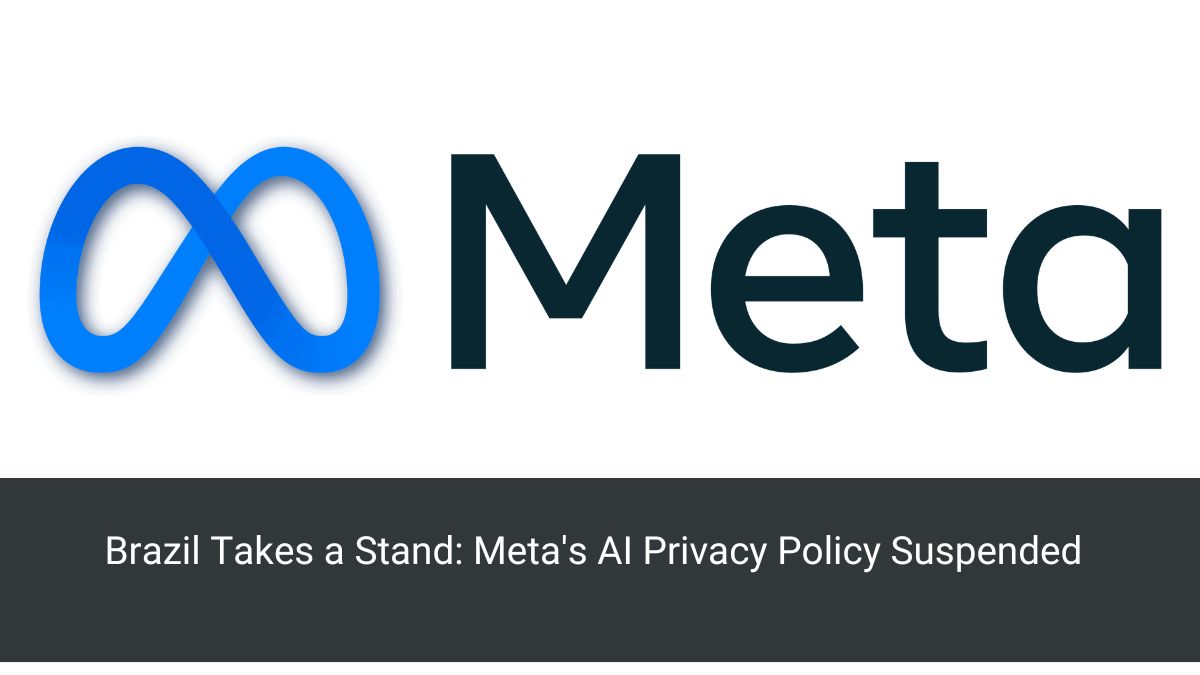Tech
Brazil Takes a Stand: Meta’s AI Privacy Policy Suspended

A Clash of Innovation and Privacy Rights
In a world where technological advancements often outpace regulatory frameworks, Brazil has taken a bold step. The country’s National Data Protection Authority (ANPD) has suspended Meta’s new privacy policy regarding the use of personal data for training generative AI systems. This move sends ripples through the tech industry, highlighting the ongoing tension between innovation and privacy rights.
As someone who’s been following the intersection of technology and privacy for years, I can’t help but feel a mix of admiration for Brazil’s proactive stance and concern about its potential implications for AI development.
The Immediate Impact
The ANPD’s decision, published in Brazil’s official gazette on July 2, 2024, has immediate and far-reaching consequences. It halts the processing of personal data across all Meta products in Brazil, affecting not just users of Meta’s platforms, but potentially anyone whose data might be captured by the tech giant’s expansive digital reach.
I remember when Meta (then Facebook) first introduced its ambitious AI plans. The promise of more personalized, intuitive experiences was exciting. But even then, a nagging voice in the back of my mind wondered about the privacy implications.
Unpacking the Decision
The ANPD’s Rationale
The ANPD didn’t make this decision lightly. They cited an “imminent risk of serious and irreparable or difficult-to-repair damage to the fundamental rights of affected holders.” It’s a weighty statement that underscores the gravity of the situation.
As I read the ANPD’s justification, I’m reminded of conversations I’ve had with friends and colleagues about the value of our personal data. We often joke about how tech companies probably know us better than we know ourselves. But there’s always an undercurrent of unease in those discussions.
The Fine Print
To ensure compliance, the ANPD has set a daily fine of 50,000 reais (approximately $8,836.58) for Meta if it fails to adhere to the suspension. It’s a significant amount, but for a company of Meta’s size, it’s more of a symbolic gesture than a crippling penalty.
Meta’s Response
Meta, unsurprisingly, expressed disappointment with the decision. The company argued that the move represents a “setback for innovation” and will delay the arrival of AI benefits to Brazilians. They also defended their approach, stating, “We are more transparent than many players in this industry who have used public content to train their models and products.”
Reading Meta’s statement, I can’t help but think of the countless times tech companies have promised transparency and user control, only for those promises to fall short in practice.
The Broader Implications
A Global Precedent?
Brazil’s decision could set a precedent for other countries grappling with similar issues. It raises important questions about the balance between technological progress and individual privacy rights.
I’m reminded of the EU’s General Data Protection Regulation (GDPR) and how it reshaped global approaches to data privacy. Could Brazil’s action be the start of a similar movement in the realm of AI and personal data?
The Future of AI Development
This suspension poses challenges for Meta’s AI ambitions, but it also opens up broader discussions about how AI should be developed and trained. If personal data becomes off-limits, how will companies ensure their AI models are robust and representative?
As an AI enthusiast, I’ve always been excited about the potential of these technologies to solve complex problems. But this situation reminds me that we can’t pursue those goals at any cost.
Navigating the Path Forward
Adapting to New Realities
Meta now faces the task of adapting its privacy policy to exclude the section related to processing personal data for generative AI training. It’s a complex undertaking that will require careful consideration of both legal requirements and user expectations.
I can’t help but wonder how this will impact the user experience on Meta’s platforms in Brazil. Will we see a noticeable difference, or will the changes happen behind the scenes?
The Role of Transparency
One of the key issues at play here is transparency. Meta claims to be more transparent than many of its competitors, but the ANPD’s decision suggests there’s still room for improvement.
In my experience, true transparency in tech often feels like a unicorn – everyone talks about it, but it’s rarely seen in its full glory. This situation presents an opportunity for Meta to set a new standard in how tech companies communicate their data practices to users.
A Call for Balanced Progress
As we navigate this complex landscape of AI development and privacy rights, it’s crucial that we find a balance. We need to harness the power of AI to drive innovation and improve our lives, but not at the expense of our fundamental rights to privacy and data protection.
For Meta and other tech giants, this means being more proactive in addressing privacy concerns before they escalate to regulatory action. For regulators, it means staying informed about technological advancements and their implications.
And for us, the users, it means staying engaged and informed. We need to understand how our data is being used and speak up when we feel our privacy is being compromised.
As we move forward, let’s embrace the potential of AI while remaining vigilant about protecting our personal information. It’s a challenging balance, but one that’s essential for building a future where technology enhances our lives without compromising our rights.
What are your thoughts on Brazil’s decision? How do you balance the benefits of AI with privacy concerns in your own digital life? Let’s keep this important conversation going.
